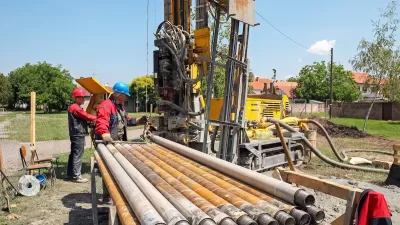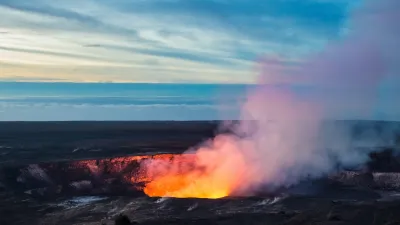Thermal energy networks can build grid resilience, provide a stable source of energy, and offer continued employment to utility workers skilled in traditional energy infrastructure.

Geothermal energy networks will soon become more available in the United States, writes June Kim in Technology Review. “In Framingham, Massachusetts, work has started on the country’s first geothermal network pilot project. Eversource, the utility company in charge, says it has completed 70% of the pipe installation and is on track to finish the project in November.” Meanwhile, New York was the first state to mandate thermal energy network projects from its largest utilities in 2022, and other states are moving forward with similar legislation.
According to Kim, “The advantages of thermal energy networks extend beyond reducing carbon emissions. Scaling them up from a few buildings to a community or utility level can also help make the grid more resilient and efficient.” This is in part because thermal energy, often acquired from waste heat, provides a more stable energy source than other renewables.
Geothermal energy networks are also attractive to unions because, unlike wind or solar installations with new and different technologies and equipment, they “rely heavily on underground piping systems, presenting an opportunity for workers with expertise in maintaining natural gas pipes to transition seamlessly into roles on those kinds of projects.”
FULL STORY: Underground thermal energy networks are becoming crucial to the US’s energy future

Alabama: Trump Terminates Settlements for Black Communities Harmed By Raw Sewage
Trump deemed the landmark civil rights agreement “illegal DEI and environmental justice policy.”

Planetizen Federal Action Tracker
A weekly monitor of how Trump’s orders and actions are impacting planners and planning in America.

How Atlanta Built 7,000 Housing Units in 3 Years
The city’s comprehensive, neighborhood-focused housing strategy focuses on identifying properties and land that can be repurposed for housing and encouraging development in underserved neighborhoods.

In Both Crashes and Crime, Public Transportation is Far Safer than Driving
Contrary to popular assumptions, public transportation has far lower crash and crime rates than automobile travel. For safer communities, improve and encourage transit travel.

Report: Zoning Reforms Should Complement Nashville’s Ambitious Transit Plan
Without reform, restrictive zoning codes will limit the impact of the city’s planned transit expansion and could exclude some of the residents who depend on transit the most.

Judge Orders Release of Frozen IRA, IIJA Funding
The decision is a victory for environmental groups who charged that freezing funds for critical infrastructure and disaster response programs caused “real and irreparable harm” to communities.
Urban Design for Planners 1: Software Tools
This six-course series explores essential urban design concepts using open source software and equips planners with the tools they need to participate fully in the urban design process.
Planning for Universal Design
Learn the tools for implementing Universal Design in planning regulations.
Jessamine County Fiscal Court
Caltrans
Institute for Housing and Urban Development Studies (IHS)
City of Grandview
Harvard GSD Executive Education
Toledo-Lucas County Plan Commissions
Salt Lake City
NYU Wagner Graduate School of Public Service





























